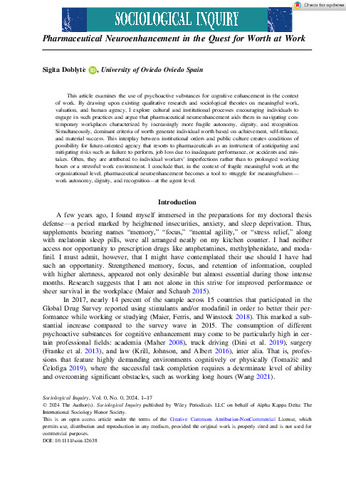Pharmaceutical Neuroenhancement in the Quest for Worth at Work
Author:
Publication date:
Editorial:
Wiley
Publisher version:
Citación:
Abstract:
This article examines the use of psychoactive substances for cognitive enhancement in the context of work. By drawing upon existing qualitative research and sociological theories on meaningful work, valuation, and human agency, I explore cultural and institutional processes encouraging individuals to engage in such practices and argue that pharmaceutical neuroenhancement aids them in navigating contemporary workplaces characterized by increasingly more fragile autonomy, dignity, and recognition. Simultaneously, dominant criteria of worth generate individual worth based on achievement, self-reliance, and material success. This interplay between institutional orders and public culture creates conditions of possibility for future-oriented agency that resorts to pharmaceuticals as an instrument of anticipating and mitigating risks such as failure to perform, job loss due to inadequate performance, or accidents and mistakes. Often, they are attributed to individual workers' imperfections rather than to prolonged working hours or a stressful work environment. I conclude that, in the context of fragile meaningful work at the organizational level, pharmaceutical neuroenhancement becomes a tool to struggle for meaningfulness—work autonomy, dignity, and recognition—at the agent level.
This article examines the use of psychoactive substances for cognitive enhancement in the context of work. By drawing upon existing qualitative research and sociological theories on meaningful work, valuation, and human agency, I explore cultural and institutional processes encouraging individuals to engage in such practices and argue that pharmaceutical neuroenhancement aids them in navigating contemporary workplaces characterized by increasingly more fragile autonomy, dignity, and recognition. Simultaneously, dominant criteria of worth generate individual worth based on achievement, self-reliance, and material success. This interplay between institutional orders and public culture creates conditions of possibility for future-oriented agency that resorts to pharmaceuticals as an instrument of anticipating and mitigating risks such as failure to perform, job loss due to inadequate performance, or accidents and mistakes. Often, they are attributed to individual workers' imperfections rather than to prolonged working hours or a stressful work environment. I conclude that, in the context of fragile meaningful work at the organizational level, pharmaceutical neuroenhancement becomes a tool to struggle for meaningfulness—work autonomy, dignity, and recognition—at the agent level.
DOI:
Collections
- Artículos [37549]
- Sociología [137]
Files in this item





